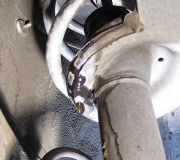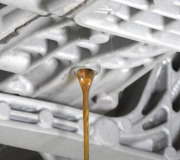Here's a copy of the trick I've used many times so I don't have to bleed at the wheels. You still can bleed at the wheels if you want to get more of the old fluid out. It WILL have some moisture in it, and it's good to get rid of that.
Loosen the two steel lines just a little, unbolt the master cylinder, then use it as a handle to bend the ends of the steel lines up a little. That will prevent the fluid from running out of them. Continue unbolting the lines. Be careful to not get brake fluid on the fenders because it eats paint.
Bench bleed the new master cylinder with the two hoses and fittings that come with it, connect the two steel lines finger tight, then push the master cylinder down to bend the lines back to their original shape. Bolt the master cylinder in place, then have a helper slowly push the brake pedal down. He can go all the way to the floor with a new master cylinder but never go more than half way with an old one because the lip seals can be ripped on the crud and corrosion that build up in the lower halves of the bores. It should take him at least 15 seconds to get the pedal half way down.
You'll see air bubbles coming from the lines. Snug the nuts, THEN tell your helper to release the pedal quickly. Loosen the nuts again, one at a time, and do the same thing until no more bubbles come out. When the pedal is pressed slowly, brake fluid will go to the wheels but any air bubbles will float back up the steel lines. If the pedal is pressed quickly, those bubbles will work their way down the line and need to be bled at the wheels.
When the pedal is released quickly, the fluid rushing back into the reservoir will wash any air bubbles back with it. That way no bleeding is necessary at the wheels.
Be absolutely certain to not get any hint of petroleum product in the brake fluid. Engine oil, transmission fluid, and power steering fluid will destroy ALL rubber parts in the system that come in contact with brake fluid. That is a real expensive repair.
Saturday, September 17th, 2011 AT 12:58 AM


